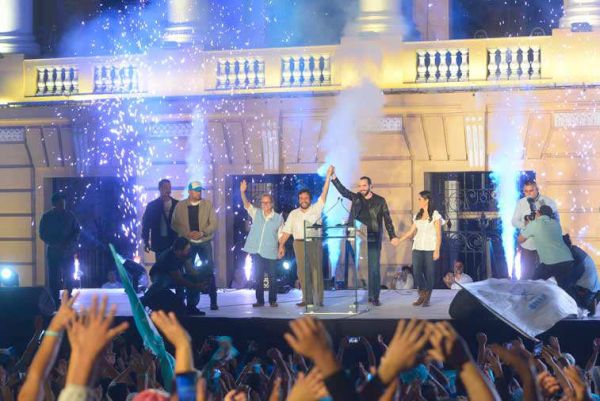
Salvadoran presidential hopeful Nayib Bukele, a former mayor campaigning as an anti-corruption outsider, has won a first-round victory in Sunday’s presidential election
Presidential candidate Nayib Bukele from the Great Alliance for National Unity (GANA) has won the presidency of El Salvador on Sunday with 53.1% of the vote while Hugo Martinez, from the ruling Farabundo Marti National Liberation Front (FMLN), was supported by 14% of the voters, according to electoral authorities. Carlos Calleja from the far right ARENA party came in second place with 31.8% of the vote. So far 80.1% of the vote has been counted.
The elections were supposed to begin at 7:00 am local time with polls closing at 5:00 pm; however, due to delays many voting centers did not open their doors till 8:00 am local time. This resulted in many voters leaving without voting as they had to go to work.
Since the end of its bloody civil war in 1992, El Salvador has been governed by just two parties: ruling leftists the FMLN, and its rival, the ARENA.
The government arranged for 23,300 agents to keep peace and security during the elections.
A total of 4,063 missions are tasked with observing the elections out of which 2,338 are national missions and 1,725 are international. The international missions include the European Union, OAS, the Inter-American Union of Electoral Organizations (UNIORE).
Bukele had started the celebrations early, proclaiming himself the winner before Julio Olivo, president of the Supreme Electoral Tribunal (TSE) had a chance to announce the winner.
Bukele told the media in a press conference immediately after the announcement, that he was thankful for the public vote of confidence, and thank you “to all those who are still waiting for the minutes to be transmitted despite the fact that the result is irreversible.”
The former Mayor of San Salvador has the backing of the Vice President of El Salvador, Óscar Ortiz, who told local media that he was “ready for a successful transition.”
Furthermore, Uruguayan Luis Almagro – currently serving as the 10th Secretary General of the Organization of the U.S., tweeted his approval, saying “We celebrate your proposal for a new chapter for #ElSalvador.”
The elections were the sixth held since the U.S.-influenced civil war (1980-1992), with the country regaining democracy in 1992. Five million voters turned-out, according to Latin American publication, Infobae.
 Escambray ENGLISH EDITION
Escambray ENGLISH EDITION





Escambray reserves the right to publish comments.